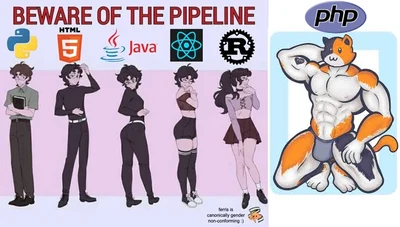

NLPcels are  over the release of GPT-4
over the release of GPT-4
- 45
- 62
Top Poster of the Day:

 cyberdick
cyberdick


Current Registered Users: 27,505

tech/science swag. 
Guidelines:
What to Submit
On-Topic: Anything that good slackers would find interesting. That includes more than /g/ memes and slacking off. If you had to reduce it to a sentence, the answer might be: anything that gratifies one's intellectual laziness.
Off-Topic: Most stories about politics, or crime, or sports, unless they're evidence of some interesting new phenomenon. Videos of pratfalls or disasters, or cute animal pictures. If they'd cover it on TV news, it's probably lame.
Help keep this hole healthy by keeping drama and NOT drama balanced. If you see too much drama, post something that isn't dramatic. If there isn't enough drama and this hole has become too boring, POST DRAMA!
In Submissions
Please do things to make titles stand out, like using uppercase or exclamation points, or saying how great an article is. It should be explicit in submitting something that you think it's important.
Please don't submit the original source. If the article is behind a paywall, just post the text. If a video is behind a paywall, post a magnet link. Fuck journos.
Please don't ruin the hole with chudposts. It isn't funny and doesn't belong here. THEY WILL BE MOVED TO /H/CHUDRAMA
If the title includes the name of the site, please leave that in, because our users are too stupid to know the difference between a url and a search query.
If you submit a video or pdf, please don't warn us by appending [video] or [pdf] to the title. That would be r-slurred. We're not using text-based browsers. We know what videos and pdfs are.
Make sure the title contains a gratuitous number or number + adjective. Good clickbait titles are like "Top 10 Ways to do X" or "Don't do these 4 things if you want X"
Otherwise editorialize. Please don't use the original title, unless it is gay or r-slurred, or you're shits all fucked up.
If you're going to post old news (at least 1 year old), please flair it so we can mock you for living under a rock, or don't and we'll mock you anyway.
Please don't post on SN to ask or tell us something. Send it to [email protected] instead.
If your post doesn't get enough traction, try to delete and repost it.
Please don't use SN primarily for promotion. It's ok to post your own stuff occasionally, but the primary use of the site should be for curiosity. If you want to astroturf or advertise, post on news.ycombinator.com instead.
Please solicit upvotes, comments, and submissions. Users are stupid and need to reminded to vote and interact. Thanks for the gold, kind stranger, upvotes to the left.
In Comments
Be snarky. Don't be kind. Have fun banter; don't be a dork. Please don't use big words like "fulminate". Please sneed at the rest of the community.
Comments should get more enlightened and centrist, not less, as a topic gets more divisive.
If disagreeing, please reply to the argument and call them names. "1 + 1 is 2, not 3" can be improved to "1 + 1 is 3, not 2, mathfaggot"
Please respond to the weakest plausible strawman of what someone says, not a stronger one that's harder to make fun of. Assume that they are bad faith actors.
Eschew jailbait. Paedophiles will be thrown in a wood chipper, as pertained by sitewide rules.
Please post shallow dismissals, especially of other people's work. All press is good press.
Please use Slacker News for political or ideological battle. It tramples weak ideologies.
Please comment on whether someone read an article. If you don't read the article, you are a cute twink.
Please pick the most provocative thing in an article or post to complain about in the thread. Don't nitpick stupid crap.
Please don't be an unfunny chud. Nobody cares about your opinion of X Unrelated Topic in Y Unrelated Thread. If you're the type of loser that belongs on /h/chudrama, we may exile you.
Sockpuppet accounts are encouraged, but please don't farm dramakarma.
Please use uppercase for emphasis.
Please post deranged conspiracy theories about astroturfing, shilling, bots, brigading, foreign agents and the like. It degrades discussion and is usually mistaken. If you're worried about abuse, email [email protected] and dang will add you to their spam list.
Please don't complain that a submission is inappropriate. If a story is spam or off-topic, report it and our moderators will probably do nothing about it. Feed egregious comments by replying instead of flagging them like a pussy. Remember: If you flag, you're a cute twink.
Please don't complain about tangential annoyances—things like article or website formats, name collisions, or back-button breakage. That's too boring, even for HN users.
Please seethe about how your posts don't get enough upvotes.
Please don't post comments saying that rdrama is turning into ruqqus. It's a nazi dogwhistle, as old as the hills.
Miscellaneous:
We reserve the right to exile you for whatever reason we want, even for no reason at all! We also reserve the right to change the guidelines at any time, so be sure to read them at least once a month. We also reserve the right to ignore enforcement of the guidelines at the discretion of the janitorial staff. Be funny, or at least compelling, and pretty much anything legal is welcome provided it's on-topic, and even then.
[[[ To any NSA and FBI agents reading my email: please consider ]]]
[[[ whether defending the US Constitution against all enemies, ]]]
[[[ foreign or domestic, requires you to follow Snowden's example. ]]]
/h/slackernews SETTINGS /h/slackernews LOG /h/slackernews MODS /h/slackernews EXILEES /h/slackernews FOLLOWERS /h/slackernews BLOCKERS




Jump in the discussion.
No email address required.
https://old.reddit.com/r/MachineLearning/comments/11rizyb/d_anyone_else_witnessing_a_panic_inside_nlp_orgs/jca3wtv/
jfc this is way too real
Jump in the discussion.
No email address required.
If only stemcels could build a career out of reproducing studies to improve replication. Robert Maxwell is in heck rn
Jump in the discussion.
No email address required.
I know it's an issue related to replication crisis either way, but I feel that STEMcels (as in hard sciences) should at least always guarantee that their results can be replicated. I'm not sure how invested you are in this topic, but this paper made by some google engineers or something tries to compare various transformer architectures across tasks and they come to the conclusion that if you accurately adjust parameters, seed and whatever else you can think of, almost every architecture can get a 'lucky' run resulting in SOTA performance.
tl;dr researchers lie
Jump in the discussion.
No email address required.
I'm in pharma and it was only 10 years ago where bayer did an in house replication study of their own r&d and only around a 1/3 could be replicated.
"Pharmaceuticals company Bayer recently revealed that it fails to replicate about two-thirds of published studies identifying possible drug targets (Nature Reviews Drug Discovery, vol 10, p 712). This rate of failure is higher than rival Amgen which reported that over the past decade its oncology and haematology researchers could not replicate 47 of 53 highly promising results they examined (Nature, vol 483, p 531)."
https://www.newscientist.com/article/mg21528826-000-is-medical-science-built-on-shaky-foundations/
Everything we take for granted could all be just a lie so some academic wagies can keep their grants and tenure.
Jump in the discussion.
No email address required.
The need for research has long since been overtaken by the actual amount of research being done. Thus, in order to distinguish yourself amongst the plethora of released findings you basically have to exaggerate or straight up lie to get any sort of attention - regardless in which field you are in. I suppose this is way worse when it comes to fields that rely on empirical methods and observations, but it is still disheartening to read statements such as yours that even 'hard' sciences are plagued by it.
Jump in the discussion.
No email address required.
It's dangerous since these industries and universities are using their research as justification for policymakers and societal/cultural movements. What even is truthful in today's society with this as the backbone?
Climate science,psychology, medicine etc are especially bad for replication. Water management had a meta study done where it found only .6% of studies could be replicated.
"A 2019 study in Scientific Data estimated with 95% confidence that of 1,989 articles on water resources and management published in 2017, study results might be reproduced for only 0.6% to 6.8%, even if each of these articles were to provide sufficient information that allowed for replication."
https://www.ncbi.nlm.nih.gov/pmc/articles/PMC6390703/
Jump in the discussion.
No email address required.
More options
Context
More options
Context
but don't forget to Trust the Science™ when it comes to jabs and climate
Jump in the discussion.
No email address required.
More options
Context
More options
Context
More options
Context
More options
Context
More options
Context